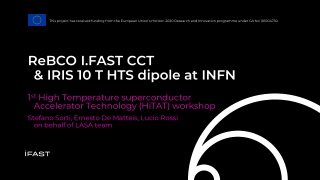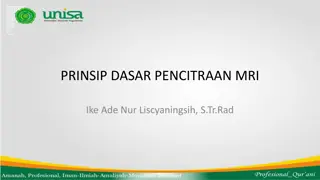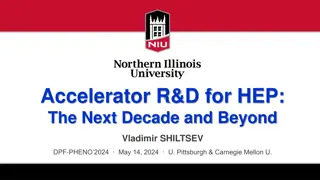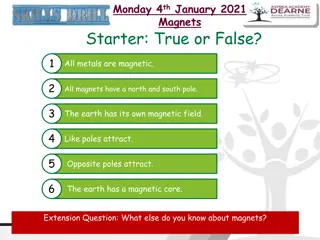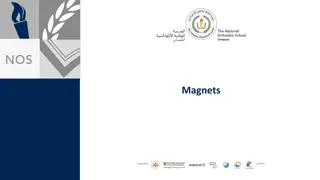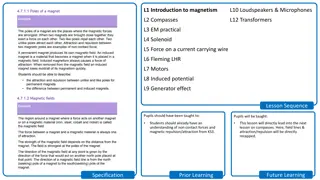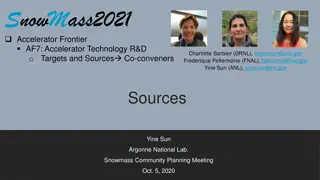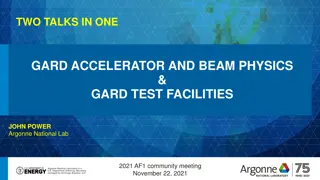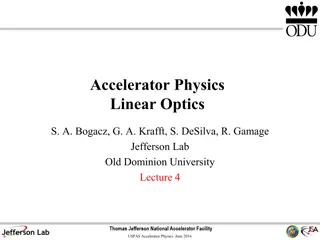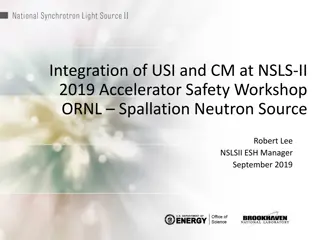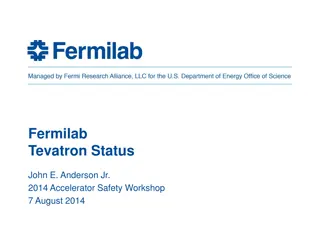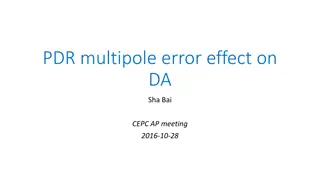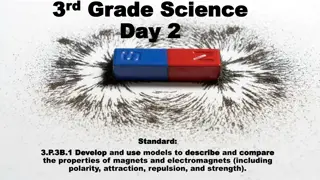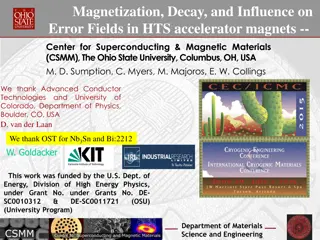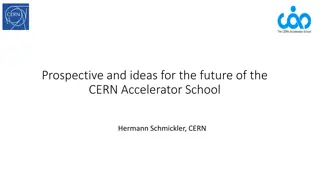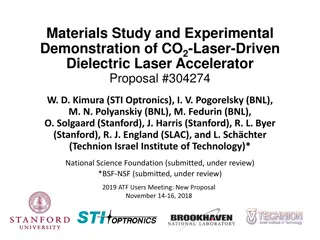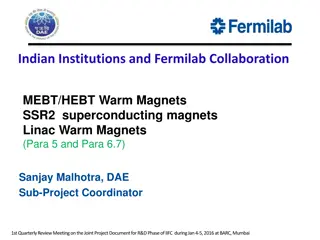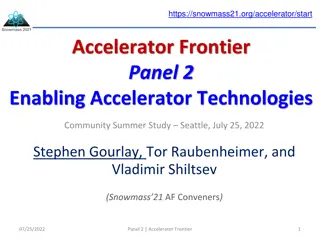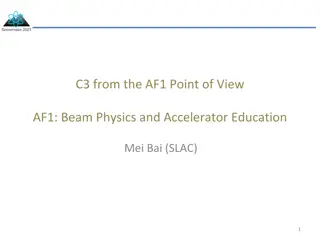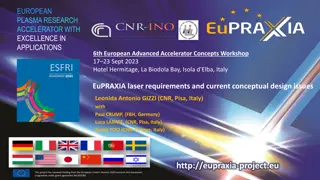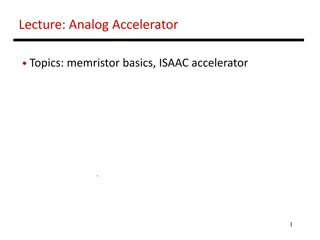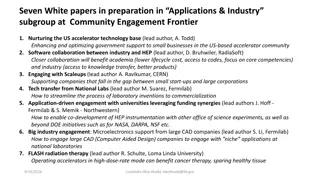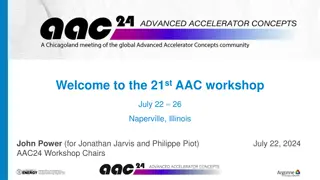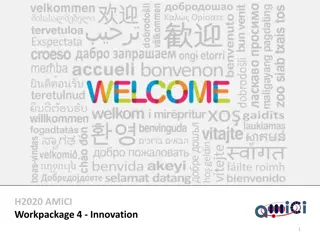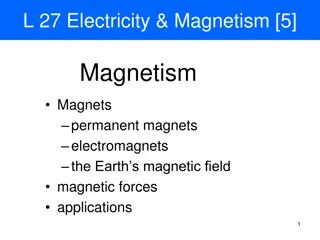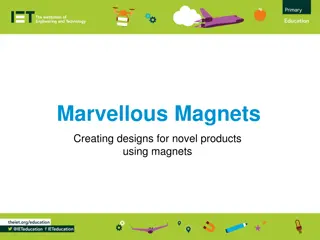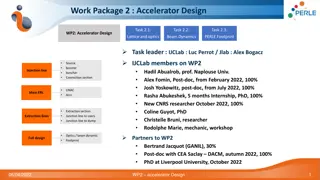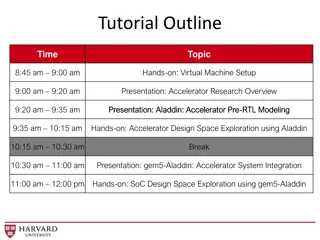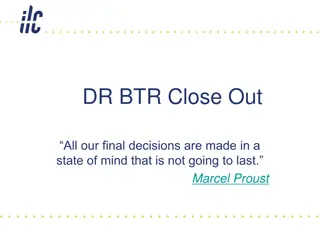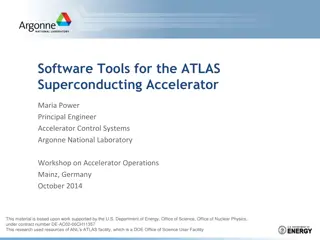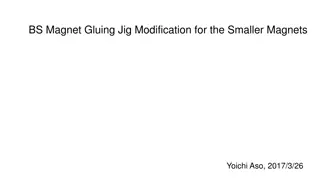Exploring Canted Cosine Theta with HTS Superconductors
This project delves into innovative superconducting magnets, particularly CCT in HTS, aiming to form strategic partnerships for HTS magnet technology in accelerators. Tasks include coordination, engineering designs, and construction of demonstrator magnets. The project also focuses on the conceptual
0 views • 16 slides
Advanced Instrumentation and Diagnostics for Superconducting Magnets at CERN
Explore the crucial needs for instrumentation and diagnostics at CERN, focusing on superconducting magnets. Topics include voltage and strain measurements, vibration analysis, temperature sensing, quench detection, and magnet form factor considerations. The importance of advanced diagnostics and com
1 views • 23 slides
Exploring Magnetism: Properties, Differences, and Similarities
Discover the properties of magnets and magnetic materials, understand the differences and similarities between permanent magnets and electromagnets. Delve into the basics of magnetism, explore magnetism stations, hypothesize about magnetic attraction, and learn interesting facts about magnets. Engag
4 views • 18 slides
Basic Principles of MRI Imaging
MRI, or Magnetic Resonance Imaging, is a high-tech diagnostic imaging tool that uses magnetic fields, specific radio frequencies, and computer systems to produce cross-sectional images of the body. The components of an MRI system include the main magnet, gradient coils, radiofrequency coils, and the
2 views • 49 slides
Current Trends in High Energy Accelerator Developments
Explore the latest trends in high energy accelerator development as discussed by experts from various institutes around the world, including proposals from China and existing accelerator projects. Learn about the classification of accelerator facilities based on size and the ongoing evolution of fut
0 views • 36 slides
European Particle Physics Strategy Update & Accelerator R&D Overview
European Particle Physics Strategy updates serve as the cornerstone for long-term decision-making in the field, with a focus on Accelerator R&D for High Energy Physics. The update process involves key questions, R&D strategies for RF technologies, and implementation plans. Approved strategies emphas
7 views • 25 slides
Accelerator R&D for High-Energy Physics: Advancements and Future Prospects
Vladimir Shiltsev's presentation at DPF-PHENO 2024 discusses the evolution of accelerator R&D in high-energy physics, emphasizing the need for off-shore Higgs factories and targeted collider developments. The P5 recommendations underscore the importance of engaging in feasibility studies for advance
0 views • 28 slides
Understanding Magnets: Properties, Attraction, and Repulsion
Explore the fascinating world of magnets through a series of True or False questions, visual aids, and practical examples. Learn about magnetic materials, the Earth's magnetic field, and the behavior of magnets when interacting with different objects. Test your knowledge with fun activities and enha
0 views • 10 slides
Understanding Magnets and Magnetic Fields
Explore the fascinating world of magnets and magnetic materials. Discover how magnets have two poles, North and South, and how they interact with each other. Learn about magnetic materials like iron, cobalt, and nickel, and understand the concept of magnetizing and demagnetizing. Dive into the magne
0 views • 15 slides
Understanding Magnetism: Introduction to Key Concepts
Delve into the fundamentals of magnetism with a focus on magnets, magnetic fields, and induced vs. permanent magnets. Explore the concepts of attraction, repulsion, magnetic materials, and the behavior of different metals in the presence of magnets. This lesson sets the foundation for a deeper under
0 views • 19 slides
Government Contractors Basics for Beginners with OK APEX Accelerator
Explore the essentials of government contracting for beginners, including details about OK APEX Accelerator (formerly PTAC), the services offered, NAICS codes, SAM registration, and more. Learn how APEX Accelerator assists businesses in participating in government contracts, offering counseling, ass
0 views • 20 slides
Accelerator Technology R&D Targets and Sources Overview
The SnowMass2021 Accelerator Frontier AF7 focuses on Accelerator Technology R&D, exploring targets and sources such as high brightness electron sources, muon sources, and high intensity ion sources. The community planning meeting discussed various Letter of Interest submissions outlining innovative
0 views • 7 slides
Accelerator Science and Beam Physics Research Overview at US National Laboratories
US high-energy physics faces budget challenges despite the need for support to remain competitive. John Power from Argonne National Laboratory discusses the importance of funding for core research and accelerator science. The GARD program in the Department of Energy Office of High Energy Physics pro
0 views • 25 slides
Linear Beam Optics and Particle Motion in Accelerator Physics
Explore the fundamental concepts of linear beam optics and particle motion in accelerator physics, covering topics such as design trajectory, path length, phase advance, transfer matrix, and more. Understand the intricacies of designing accelerators and the mathematical representations involved in o
0 views • 78 slides
Safety Assessment and Accelerator Safety Envelope Review
Overview of the Safety Assessment Document (SAD) and Accelerator Safety Envelope (ASE) process for the 400 MeV Test Area (MTA) at Fermilab. The document details the shielding assessment, approval process by various committees, and updates made to the SAD chapters and the Accelerator Safety Envelope.
5 views • 8 slides
Integration of USI and CM at NSLS-II 2019 Accelerator Safety Workshop
This document outlines the Integration of Unreviewed Safety Issues (USI) and Configuration Management (CM) at the NSLS-II 2019 Accelerator Safety Workshop conducted at the ORNL Spallation Neutron Source. It covers the USI process, screening evaluations, training, and qualifications necessary for the
0 views • 13 slides
Overview of Fermilab's Tevatron Accelerator Facility
The Fermilab Tevatron was once a powerful particle accelerator in the US, known for significant discoveries such as the Top Quark. Currently, the Tevatron is effectively mothballed for safety reasons, with measures taken to secure the facility. This includes removing cryogens, disconnecting power su
0 views • 7 slides
Analysis of Multipole Error Effects on Beam Dynamics in CEPC Accelerator
The content discusses the impact of multipole errors on the beam dynamics at the CEPC Accelerator, focusing on sources of error, measurements, and potential effects on the beam. The analysis includes different types of multipole errors, their sources, and the resulting changes in tune and emittance
4 views • 11 slides
Understanding Magnets and Electromagnets in 3rd Grade Science
Explore the unique properties of magnets and electromagnets in this 3rd Grade Science lesson. Learn about polarity, attraction, repulsion, and strength. Discover how magnets work, the importance of poles, and the behavior of like and unlike poles. Dive into the world of magnets to develop models and
0 views • 16 slides
Development of Ultra-Thin Magnets for FCC-ee Experiments
Overview of the motivation, concept, and design principles behind the development of ultra-thin magnets for FCC-ee experiments, focusing on obtaining transparent magnets, high-strength conductor development, magnet design, quench protection, and vacuum vessel transparency. The project aims to create
0 views • 9 slides
Magnetization, Decay, and Error Fields in HTS Accelerator Magnets
The research conducted at The Ohio State University focuses on understanding the magnetization, decay, and influence of error fields in high-temperature superconducting (HTS) accelerator magnets. The study explores the impact of different superconducting materials such as Nb3Sn, YBCO, and Bi:2212 on
0 views • 21 slides
Future Prospects and Evolving Ideas for the CERN Accelerator School
The CERN Accelerator School is planning upcoming schools and venues, with proposals for its evolution presented. Courses cover various topics across Member States, with a focus on advanced accelerator physics. A future HEP Collider School is also in the pipeline. Suggestions for improvement include
0 views • 16 slides
CO2-Laser-Driven Dielectric Laser Accelerator Proposal
Study and experimental demonstration of a CO2-laser-driven dielectric laser accelerator, addressing the limitations of current accelerator technologies by utilizing longer laser wavelengths for increased charge and improved beam control. The proposal aims to develop a novel in-vacuo scheme for ultra
0 views • 13 slides
Esti-Mysteries with Magnets: Solving the Total Number Puzzle
Explore the engaging Esti-Mystery activity involving magnets to solve a puzzle and determine the total number of magnets. Follow the clues provided and use estimation to narrow down possibilities as you progress. Enhance mathematical thinking and problem-solving skills through interactive learning.
0 views • 22 slides
Collaboration Between Indian Institutions and Fermilab for Magnet Production
Collaboration between Indian institutions and Fermilab for the production of various magnets for the Medium Energy Beam Transport line, including warm and superconducting magnets. Updates on the progress, deliverables, recommendations for series production, and key milestones discussed during the 1s
0 views • 12 slides
Future of Accelerator Technologies: Enhancing Colliders and R&D Programs
The Accelerator Frontier Panel discusses the crucial components to enable future accelerators, emphasizing the need for a National Future Collider R&D Program, General Accelerator R&D, and adequate accelerator and test facilities. The message stresses the importance of an integrated future collider
0 views • 17 slides
Recommendations for Advancing Beam Physics and Accelerator Education
The exploration of new physics demands future accelerators beyond 1 TeV lepton colliders and 100 TeV hadron colliders, requiring luminosity in a specific range. Various challenges, including reaching quantum limits, face conventional RF-based beams. The pursuit of disruptive acceleration technologie
0 views • 7 slides
European Plasma Research Accelerator with Excellence in Applications
The European Plasma Research Accelerator project, also known as EuPRAXIA, is a cutting-edge initiative that aims to develop a laser driver for advanced accelerator concepts. Led by a team of experts from various European countries, the project focuses on laser requirements, overall layout, thermal m
0 views • 33 slides
Analog Accelerator: Memristor Basics and ISAAC Accelerator
Explore the world of analog acceleration with topics covering memristor basics and the ISAAC accelerator. From understanding noisy analog phenomena to leveraging wires as ALUs, delve into crossbars for vector-matrix multiplication and the challenges of high ADC/DAC area/energy. Discover solutions li
0 views • 23 slides
Engaging Innovation in Accelerator Technology and Industry Partnerships
This collection of seven white papers explores a variety of topics in the fields of accelerator technology and industry collaborations. Topics range from nurturing the US accelerator technology base to enhancing government support for small businesses in the accelerator community. The papers also de
0 views • 6 slides
Advanced Accelerator Concepts Workshop Highlights and Vision
The 21st AAC workshop held in Naperville, Illinois, showcased research on advanced accelerator physics and engineering. Key themes included developing cost-effective facilities for high-energy physics and photon science, as well as compact facilities for industrial, medical, and security application
0 views • 10 slides
Advancing European Innovation in Accelerator and Magnet Technologies
The AMICI H2020 project aims to enhance collaboration between European companies to drive innovation in mature Accelerator and Magnet technologies. Through round table discussions, the project seeks to identify opportunities for industry engagement, establish collaborative frameworks, and optimize t
0 views • 17 slides
Understanding Magnetism: From Permanent Magnets to Electromagnetism
Explore the fascinating world of magnetism, covering topics such as permanent magnets, electromagnets, Earth's magnetic field, and the applications of magnetic forces. Discover how magnets work, the properties of permanent magnetism, and the relationship between magnetic and gravitational fields. De
0 views • 25 slides
Exploring the World of Magnets: Designs, Properties, and Applications
Delve into the fascinating realm of magnets, learning about their composition, attraction and repulsion properties, as well as their diverse applications in various products. Discover how magnets are used in innovative designs and get inspired to create your own magnetic products.
0 views • 7 slides
Workshop on Maintaining PIP-II within the Accelerator Complex - Operational Requirements and Interfaces
This workshop, held on July 15, 2021, focuses on maintaining the PIP-II within the Accelerator Complex through discussions on uptime, availability, maintainability, and operability requirements. The event covers various presentations on system interfaces, maintenance strategies, and operational expe
0 views • 4 slides
Accelerator Design and DC Photogun Project Overview
This project overview outlines the tasks and goals related to Accelerator Design and DC Photogun within Work Packages 2 and 3. It includes details on team members, task leaders, activities, equipment, international collaborators, and identified contributors. Key focus areas encompass accelerator des
0 views • 13 slides
Accelerator Design Space Exploration Tutorial
This tutorial covers hands-on activities and presentations on virtual machine setup, accelerator research overview, RTL modeling, design space exploration using Aladdin, gem5-Aladdin for system integration, and SoC design space exploration. Aladdin, a pre-RTL power-performance accelerator simulator,
0 views • 52 slides
Advanced Particle Accelerator Project Updates
Explore the latest updates on the advanced particle accelerator project, including decisions on operating scenarios, lattice parameters, RF considerations, and construction criteria for the accelerator facility. Cost adjustments, upgrade plans, and timelines for key components are discussed, emphasi
0 views • 9 slides
Control System Overview for ATLAS Superconducting Accelerator
The ATLAS Control System Group manages control systems from ion sources to specified areas, utilizing hardware such as AlphaServer and various controllers. Software tools from Vista Control Systems offer real-time control functionalities for OpenVMS, Linux, and Windows. Data management includes CAMA
0 views • 17 slides
Magnet Gluing Jig Modification for Small Magnets
Explore Yoichi Aso's 2017 modification of a magnet gluing jig for smaller magnets, complete with detailed images showcasing the process and tools used, such as the mirror box middle plate and clearance fits. This innovative approach aims to enhance precision and efficiency in handling smaller magnet
0 views • 6 slides
